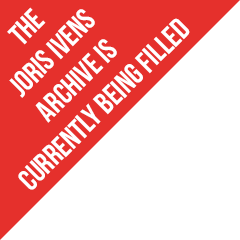

The son of documentary filmmaker Leo Hurwitz created a beautiful website about the films of his father. Most of his unique social documentaries are available on-line now and proof their current value. Joris Ivens used excerpts from Hurwitz’ films in at least four of his documentaries, like the wellknown and shocking ‘looting & shooting’ sequence of policemen against steelworkers on strike in 1993 in Ambridge. https://leohurwitz.com/
Borinage and New Earth
In Borinage (1934), an iconic documentary about the economic crisis and a miners strike in Wallonia (Belgium), the two directors Joris Ivens and Henri Storck included footage from Leo Hurwitz’ compilation film The World in Review and America Today (1933-34). Hurwitz used scenes filmed by commercial newsreel companies and surpressed or only partially distributed. For instance the sequence, shot in Ambridge (Pa) in October 1933 of a picketline of the Steel and Metal Workers Industrial Union, which was attacked by armed policemen and armed ‘deputies’of the bosses. The same documentary of Hurwitz provided Ivens of footage for New Earth (1933), when he needed visual proof of the waste of milk during the economic crisis. Because it was too little, he re-enacted a scene with wasting food by throwing it away in the river Seine in France as an indictment against speculation with food at a time when millions suffered from hunger and starvation.
The Spanish Earth
The third film with an exchange of footage is Heart of Spain (1937). Leo Hurwitz was asked by Ben Maddow to make a film based on the footage he and Hungarian photographer Geza Karpathi made in Spain during the Spanish Civil War. It was about the blood bank of Canadian physician Norman Bethune in support of the soldiers of the International Brigades. However the footage was too little and too shaky and Hurwitz decided, together with Paul Strand, to extend the focus of the film to the struggle against fascism. The two partners of Frontier Films scenarized and edited the material in mid 1937. For this they needed footage made on the battlefield in Spain by Russian filmmaker Roman Karmen and by Joris Ivens and John Ferno for The Spanish Earth, Not only some sequences in Heart of Spain and The Spanish Earth are similar, also larger parts of the film score coincide, some folksongs and other music are the same. Ivens’ film with the commentary text of Hemingway was premiered on 12 June, while Heart of Spain was released three months later in the same film theatre (Playhouse on 55th street in New York).
Song of the Rivers
The fourth Hurwitzfilm with a relationship with an Ivensdocumentary is Native Land (1942), a film about the fight of the unions to organize and for liberty against anti-democratic forces, the conspiracy and violence that surpressed workers’constitutional rights. It took five years for Leo Hurwitz and Paul Strand, directors of Frontier Films, to realize this docudrama. Although it is not sure when, Ivens received a 35 mm. print of this film in East-Berlin in 1954 and included excerpts from it in Song of the Rivers (1955). Both Ivens and Hurwitz and Strand were in favour of re-enactment, of staged scenes with either actors or non-actors. Another similarity between Native Land and Song of the Rivers is the opening sequence with the metaphors of the beauty of nature. Probably Native Land also inspired Ivens to ask singer Paul Robeson to sing for Song of the Rivers.
Leo Hurwitz
Leo Hurwitz (1909-1991), though not widely known today, was one of the important pioneers of the documentary film. Through this site https://leohurwitz.com/, you can experience the wide and exciting spectrum of his films (virtually all of his available work is streaming here); find out about the passion behind the invention of the social documentary on the part of Hurwitz and his colleagues; find out about the price they paid as progressive ideas and content were viciously repressed in America in the middle of the century; learn about the forefathers and mothers of our present documentary boom.